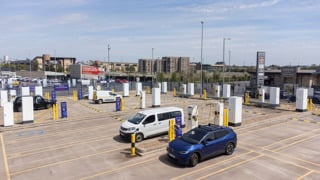Electric and hybrid vehicles are likely to account for 58% of all new car sales in Europe, the USA and China by 2025, according to the latest Digital Auto Report 2017 from Strategy& - PwC’s strategic consulting team.
This forecast comes on the back of a policy push by both the French and UK governments to ban petrol and diesel new car sales by 2040, with the Scottish government aiming for 2032.
Customer spend on what is being termed as the ‘roboconomy’ - connected and self-driving cars through to associated digital services - is also forecast to reach 2.2 trillion euros annually by 2030.
It expects that Europe, USA and China will collectively be home to more than 470 million connected cars by 2025.
Cara Haffey, PwC UK automotive leader said: “Our analysis shows that with a definitive breakthrough on electric vehicles only a few years away, sometime between 2025 and 2030, electric cars will become cheaper to run than petrol or diesel models, when you factor in traditional costs such as depreciation, fuel, servicing, taxes and insurance.
“Alongside developments in the vehicle powertrain we are also seeing substantial increases in the level of vehicle connectivity.
"According to the report, more than 85% of all new cars can already be classed as connected.
"As our recent study with SMMT shows, this can have a significant impact on the social, educational, health and employability opportunities for young, old and disabled people.
“When you also factor in the growing ‘roboeconomy’, there are a wide range of implications for the auto industry and investors to consider as it looks to the future.”
The report adds that by 2030, just over 20% of the profit potential in the mobility market will be occupied by 'mobility as a service', further increasing the pressure on margins in the conventional car production segment.
In future, barely 50% of sectoral value-added will be contributed from car production or car sales – today, the figure is around 85%. The remaining part will be played out in the fleet management and digital services areas.
The report also suggests that by 2030:
● 36% of all mileage in Europe will be in shared-use vehicles with 42% in self-driving vehicles.
● Europeans are expected to show the greatest interest in privately owned self-driving cars (16%) compared to 11% in the USA and 10% in China.
● As road-based mobility improves, Europe, USA and China could see a 23% increase in the number of miles driven (compared to 2017), with average household spending on mobility around 10% less.
● Rapid build-up of self-driving vehicle fleets will result in a 28% increase in new car sales. In the long term, however, shared use will mean 25% fewer cars travelling on the roads in Europe and the USA and in other mature markets, compared to today.
● Market volume in shared mobility will rise annually by 24% in Europe, the USA and China alone over the period to 1.3 billion euros, with around 33% of all new vehicles used for shared mobility.
Mark Couttie, Strategy& Automotive specialist, added: “The automotive sector here in the UK, as with other territories, is likely to undergo a huge upheaval as the transition to shared or self-driving fleets gathers pace.
“Business segments such as the used car trade are likely to be challenged due to rapid depreciation in vehicle values while manufacturers will become increasingly engaged in regular servicing work on fleet vehicles.
"We’re also seeing some automotive giants reacting to these MaaS disruptors by entering into partnerships with innovative ride-hailing services.
“With planned trials of driverless vehicles underway, the route to commercial reality is firmly on track.
"As this materialises, the role of the consumer and human-machine interaction will vastly differ from today.
"For example, the current extremely low use of cars by private owners, which currently stands at approximately 5-10% per day, is likely become a thing of the past.
“One possible consequence of this increased usage could be a decrease in consumer demand to purchase cars, something which the industry - from manufacturers to dealers and distributors - will have to adapt to.”



















Login to comment
Comments
No comments have been made yet.